A few weeks I conducted a survey on what game developers think about the Bible. I posted it to a few places around the net, including Gamedev.net where the thread rumbled along for almost three weeks. Somebody even went to the trouble of setting up a new account in the name of God Almighty so that he could chip in his opinion on the matter!
My Aims
Although I posted it to a secular game development forum, I’ll be honest in saying that my main interest was in how opinions differed between those who considered themselves “believers”. I was especially curious to see if your beliefs were likely to be more or less conservative on the Bible if you were somebody who had a proven track record of finishing and releasing games.
My Methods
As many were not shy to point out, my survey was entirely unscientific  It was thoroughly self-selecting in terms of who would actually fill it out, and the validity of the data was no doubt seriously undermined by the fact that the people who have a proven track record of finishing and releasing games probably aren’t hanging around in the GD Net Lounge filling out random surveys by complete nobodies. But it was all done in a spirit of fun and so I shall continue to draw nonsense conclusions from my useless data and proudly proclaim it as fact – this is my blog, after all, and you can’t stop me!
It was thoroughly self-selecting in terms of who would actually fill it out, and the validity of the data was no doubt seriously undermined by the fact that the people who have a proven track record of finishing and releasing games probably aren’t hanging around in the GD Net Lounge filling out random surveys by complete nobodies. But it was all done in a spirit of fun and so I shall continue to draw nonsense conclusions from my useless data and proudly proclaim it as fact – this is my blog, after all, and you can’t stop me!
Summary of Responses
Let’s begin with a bit of overall response data. In total I had 229 responses, but a lot of those only filled out their age and experience and then gave up when it got to the Bible stuff. 154 people made it as far as stating whether they believed in God or not.
Age of Respondents
| Age | Responses |
|---|---|
| Under 18 | 11 (4.8%) |
| 18-30 | 154 (67.25%) |
| 31-50 | 58 (25.33%) |
| Over 50 | 6 (2.62%) |
| Total | 229 |
Contexts
| Context | Responses |
|---|---|
| No experience so far | 10 (4.37%) |
| Just as a hobby in my spare time | 146 (63.76%) |
| I’m running my own independent games company | 30 (13.1%) |
| I work for a commercial games company | 33 (14.41%) |
| During my insomniac blackout periods, operating as an alter ego | 11 (4.8%) |
| Other | 10 (4.37%) |
Games Published
| Number Published | Responses |
|---|---|
| None so far | 67 (31.31%) |
| 1-2 | 84 (39.25%) |
| 3-10 | 50 (23.36%) |
| More than 10 | 6 (2.8%) |
| All of them. All the games. | 7 (3.27%) |
Belief In God
I wish I had asked a clearer question separating out those who had some kind of belief in God and those who didn’t, and probably something separating those who identified as “Christians” from everybody else. As it was, I made the mistake of asking the question negatively, and you have to trust that people who ticked “strongly disagree” hadn’t got themselves muddled up with which way around it all was. But oh well, you have to work with the data you’ve got!
Statement: “I don’t believe there is a God to know”
| Strongly disagree | 56 (36.36%) |
| Vaguely disagree | 6 (3.9%) |
| Not sure either way | 10 (6.49%) |
| Vaguely agree | 18 (11.69%) |
| Strongly agree | 64 (41.56%) |
Familiarity With The Bible
On of the questions asked respondents to rate various sections of the Bible according to how familiar they found it. I found the results of this slightly surprising! Here they are, ordered from the most familiar to the least familiar:
- Gospels (Matthew, Mark, Luke, John)
- Old Testament narrative (Genesis, Exodus, etc.)
- Revelation
- New Testament letters (Romans, Galatians, etc.)
- Old Testament prophets (Isaiah, Ezekiel, etc.)
- Proverbs
- Psalms
I probably shouldn’t have underestimated people’s fascination with the book of Revelation! Here in the U.K. we preach far more on the New Testament letters and then on the Gospels, so I kind of expected the results to reflect that – but that clearly just shows off my cultural biases!
This list didn’t seem to vary very much if you just filtered out the believers.
The Nature of the Bible
Next I asked a bunch of questions about the nature of the Bible – what kind of book is it? I’ve broken down the results into four categories: total (listing all of the results for that question), believers (everybody who strongly disagreed with the statement that there is no God), published believers (the subset of believers who have published at least one game) and believing professionals (who I defined as the subset of published believers who either work for a commercial games company or who run their own independent games company).
Statement 1: “It presents a genuine record of ancient people’s understanding of reality”
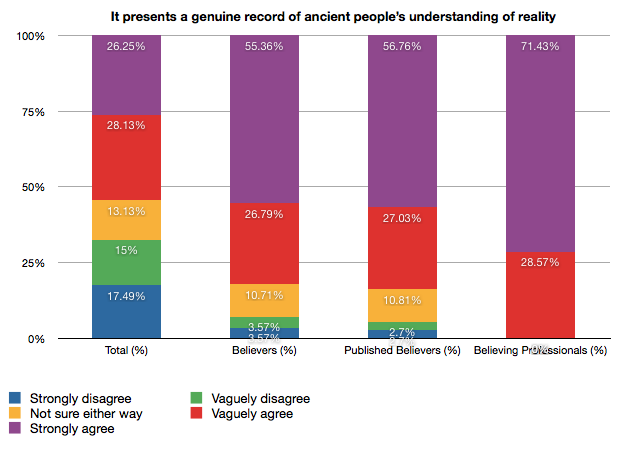
| Response | Total | Believers | Published Believers | Believing Professionals |
| Strongly disagree | 28 (17.%) | 2 (3.57%) | 1 (2.7%) | 0 (0%) |
| Vaguely disagree | 24 (15%) | 2 (3.57%) | 1 (2.7%) | 0 (0%) |
| Not sure either way | 21 (13.13%) | 6 (10.71%) | 4 (10.81%) | 0 (0%) |
| Vaguely agree | 45 (28.13%) | 15 (26.79%) | 10 (27.03%) | 4 (28.57%) |
| Strongly agree | 42 (26.25%) | 31 (55.36%) | 21 (56.76%) | 10 (71.43%) |
| Total | 160 | 56 | 37 | 14 |
Statement 2: “The authors of the Bible had their own purposes when writing”
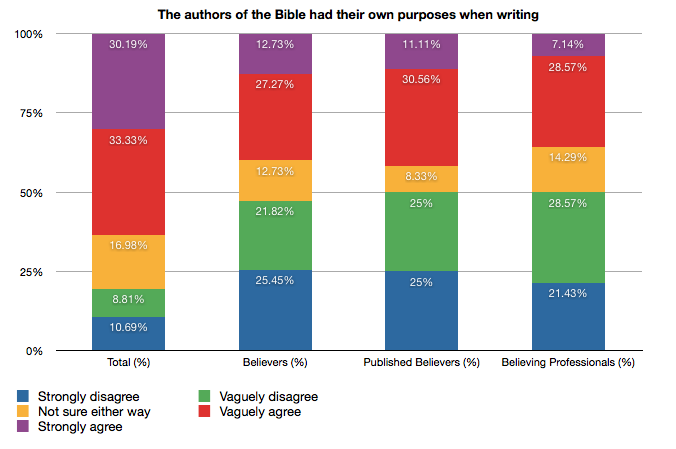
| Response | Total | Believers | Published Believers | Believing Professionals |
| Strongly disagree | 17 (10.69%) | 14 (25.45%) | 9 (25%) | 3 (21.43%) |
| Vaguely disagree | 14 (8.81%) | 12 (21.82%) | 9 (25%) | 4 (28.57%) |
| Not sure either way | 27 (16.98%) | 7 (12.73%) | 3 (8.33%) | 2 (14.29%) |
| Vaguely agree | 53 (33.33%) | 15 (27.27%) | 11 (30.56%) | 4 (28.57%) |
| Strongly agree | 48 (30.19%) | 7 (12.73%) | 4 (11.11%) | 1 (7.14%) |
| Total | 159 | 55 | 36 | 14 |
This statement, about author intent, proved to be the most controversial question amongst believers in the entire survey. There was far more uncertainty and lack of agreement between respondents than for any other question. That may mean it’s an ambiguous statement, or it may be revealing something about different ways of thinking about the nature of the Bible. For what it’s worth, my intent was to try and distinguish a dual-authorship model of the Bible (where men write as driven along by the Holy Spirit) from a kind of “dictated” model, as per the Qu’ran within Islam.
Statement 3: “The Bible is a cohesive whole with a unified message”
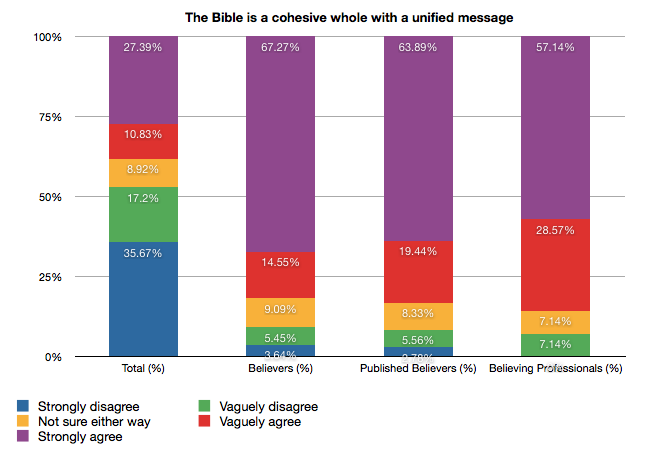
| Question | Total | Believers | Published Believers | Believing Professionals |
| Strongly disagree | 56 (35.67%) | 2 (3.64%) | 1 (2.78%) | 0 (0%) |
| Vaguely disagree | 27 (17.2%) | 3 (5.45%) | 2 (5.56%) | 1 (7.14%) |
| Not sure either way | 14 (8.92%) | 5 (9.09%) | 3 (8.33%) | 1 (7.14%) |
| Vaguely agree | 17 (10.83%) | 8 (14.55%) | 7 (19.44%) | 4 (28.57%) |
| Strongly agree | 43 (27.39%) | 37 (67.27%) | 23 (63.89%) | 8 (57.14%) |
| Total | 157 | 55 | 36 | 14 |
I can’t really be bothered to show the results here in this blog post, but rather strangely, more people ended up saying that “the message of the Bible is divinely inspired” than those who thought there was a single, coherent message!
Statement 4: “The words of the Bible are divinely inspired”
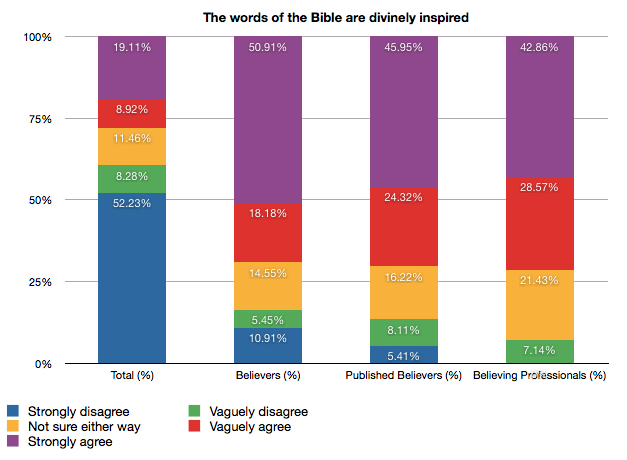
| Response | Total | Believers | Published Believers | Believing Professionals |
| Strongly disagree | 82 (52.23%) | 6 (10.91%) | 2 (5.41%) | |
| Vaguely disagree | 13 (8.28%) | 3 (5.45%) | 3 (8.11%) | 1 (7.14%) |
| Not sure either way | 18 (11.46%) | 8 (14.55%) | 6 (16.22%) | 3 (21.43%) |
| Vaguely agree | 14 (8.92%) | 10 (18.18%) | 9 (24.32%) | 4 (28.57%) |
| Strongly agree | 30 (19.11%) | 28 (50.91%) | 17 (45.95%) | 6 (42.86%) |
| Total | 157 | 55 | 37 | 14 |
Interpreting the Bible
Next I asked a bunch of questions about our ability to understand and interpret the Bible. These were basically to gauge how post-modern we all were 
Statement 5: “The Bible completely baffles me”
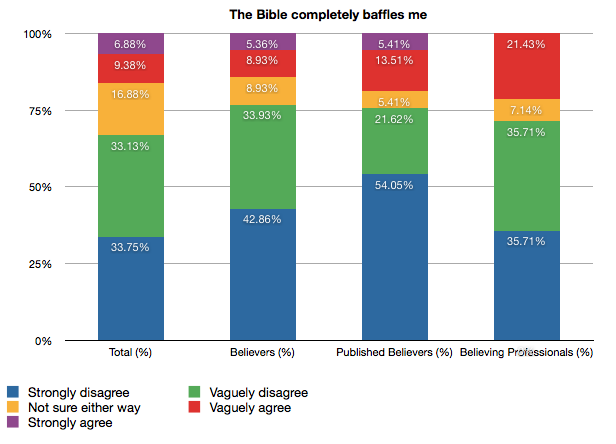
| Response | Total | Believers | Published Believers | Believing Professionals |
| Strongly disagree | 54 (33.75%) | 24 (42.86%) | 20 (54.05%) | 5 (35.71%) |
| Vaguely disagree | 53 (33.13%) | 19 (33.93%) | 8 (21.62%) | 5 (35.71%) |
| Not sure either way | 27 (16.88%) | 5 (8.93%) | 2 (5.41%) | 1 (7.14%) |
| Vaguely agree | 15 (9.38%) | 5 (8.93%) | 5 (13.51%) | 3 (21.43%) |
| Strongly agree | 11 (6.88%) | 3 (5.36%) | 2 (5.41%) | 0 (0%) |
| Total | 160 | 56 | 37 | 14 |
Statement 6: “Some interpretations of a passage are more valid than others”
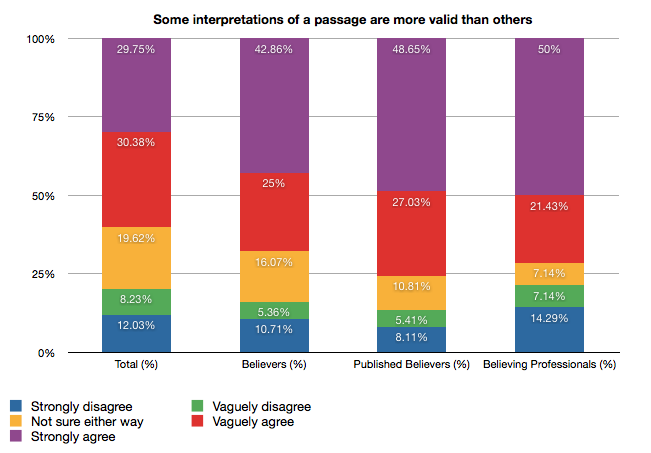
| Response | Total | Believers | Published Believers | Believing Professionals |
| Strongly disagree | 19 (12.03%) | 6 (10.71%) | 3 (8.11%) | 2 (14.29%) |
| Vaguely disagree | 13 (8.23%) | 3 (5.36%) | 2 (5.41%) | 1 (7.14%) |
| Not sure either way | 31 (19.62%) | 9 (16.07%) | 4 (10.81%) | 1 (7.14%) |
| Vaguely agree | 48 (30.38%) | 14 (25%) | 10 (27.03%) | 3 (21.43%) |
| Strongly agree | 47 (29.75%) | 24 (42.86%) | 18 (48.65%) | 7 (50%) |
| Total | 158 | 56 | 37 | 14 |
Maybe it’s because we’re all computer programmers and not arts students, but there was a surprising lack of dissent about the notion that some interpretations of a passage might be wrong, even amongst non-believers.
Statement 7: “An interpretation of a passage is more valid if it is closer to the author’s intent”
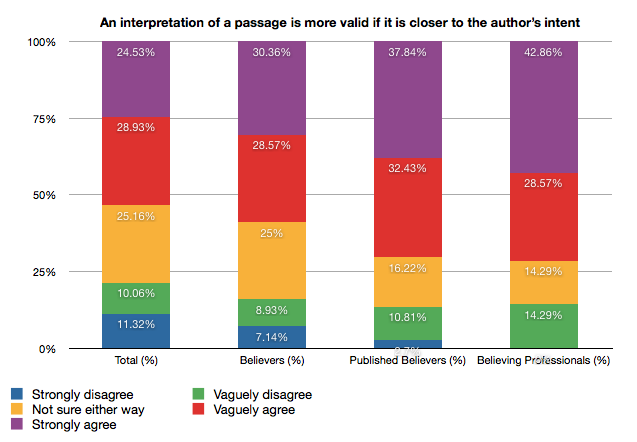
| Response | Total | Believers | Published Believers | Believing Professionals |
| Strongly disagree | 18 (11.32%) | 4 (7.14%) | 1 (2.7%) | 0 (0%) |
| Vaguely disagree | 16 (10.06%) | 5 (8.93%) | 4 (10.81%) | 2 (14.29%) |
| Not sure either way | 40 (25.16%) | 14 (25%) | 6 (16.22%) | 2 (14.29%) |
| Vaguely agree | 46 (28.93%) | 16 (28.57%) | 12 (32.43%) | 4 (28.57%) |
| Strongly agree | 39 (24.53%) | 17 (30.36%) | 14 (37.84%) | 6 (42.86%) |
| Total | 159 | 56 | 37 | 14 |
Again, most people seemed happy with the idea that seeking out the author’s purpose was the right thing to do. But people were less confident about this than for the more general statement about there being a right answer.
Statement 8: “It is possible (if sometimes difficult) to get close to understanding an author’s intent”
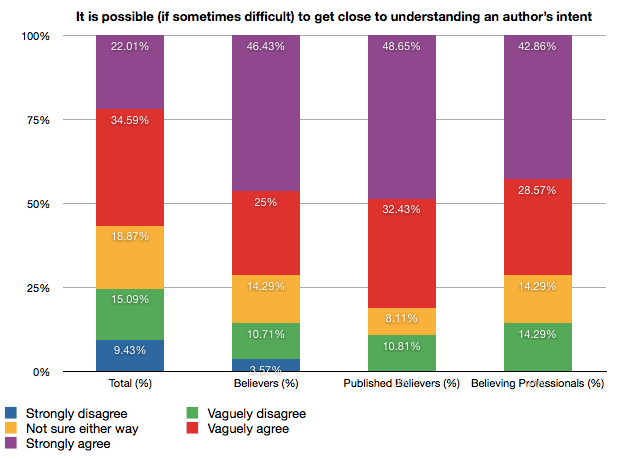
| Response | Total | Believers | Published Believers | Believing Professionals |
| Strongly disagree | 15 (9.43%) | 2 (3.57%) | 0 (0%) | 0 (0%) |
| Vaguely disagree | 24 (15.09%) | 6 (10.71%) | 4 (10.81%) | 2 (14.29%) |
| Not sure either way | 30 (18.87%) | 8 (14.29%) | 3 (8.11%) | 2 (14.29%) |
| Vaguely agree | 55 (34.59%) | 14 (25%) | 12 (32.43%) | 4 (28.57%) |
| Strongly agree | 35 (22.01%) | 26 (46.43%) | 18 (48.65%) | 6 (42.86%) |
| Total | 159 | 56 | 37 | 14 |
Statement 9: “We need God’s help to understand a passage’s meaning”
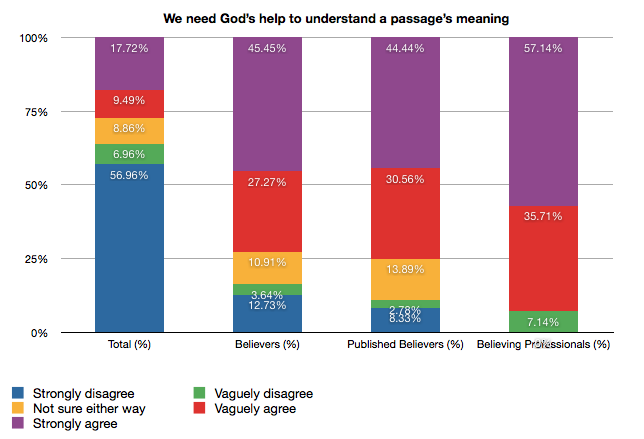
| Response | Total | Believers | Published Believers | Believing Professionals |
| Strongly disagree | 90 (56.96%) | 7 (12.73%) | 3 (8.33%) | 0 (0%) |
| Vaguely disagree | 11 (6.96%) | 2 (3.64%) | 1 (2.78%) | 1 (7.14%) |
| Not sure either way | 14 (8.86%) | 6 (10.91%) | 5 (13.89%) | 0 (0%) |
| Vaguely agree | 15 (9.49%) | 15 (27.27%) | 11 (30.56%) | 5 (35.71%) |
| Strongly agree | 28 (17.72%) | 25 (45.45%) | 16 (44.44%) | 8 (57.14%) |
| Total | 158 | 55 | 36 | 14 |
I can’t really bother to include the results, but interestingly more people thought God helps us understand the Bible today than who thought we need God’s help to understand the Bible – so I guess people think of God as generous and giving us help that we don’t really need 
The Relevance of the Bible Today
The next set of questions were about the relevance of the Bible in the 21st century.
Statement 10: “Reading the Bible is dangerous”
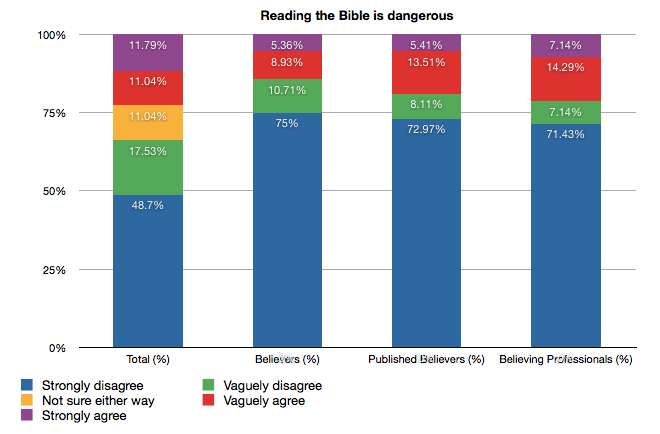
| Response | Total | Believers | Published Believers | Believing Professionals |
| Strongly disagree | 75 (48.7%) | 42 (75%) | 27 (72.97%) | 10 (71.43%) |
| Vaguely disagree | 27 (17.53%) | 6 (10.71%) | 3 (8.11%) | 1 (7.14%) |
| Not sure either way | 17 (11.04%) | 0 (0%) | 0 (0%) | 0 (0%) |
| Vaguely agree | 17 (11.04%) | 5 (8.93%) | 5 (13.51%) | 2 (14.29%) |
| Strongly agree | 18 (11.79%) | 3 (5.36%) | 2 (5.41%) | 1 (7.14%) |
| Total | 154 | 56 | 37 | 14 |
This question was mostly a bit of fun. I imagine everybody interpreted it differently – some taking it to mean that the Bible was a dangerous relic of the past that puts strange and violent ideas in the heads of ignorant people, and a few people like me taking it as saying something about the divine power of God’s word to change those who read it. But mostly people seem to have taken it at face value.
Statement 11: “The Bible’s message is uniquely valuable”
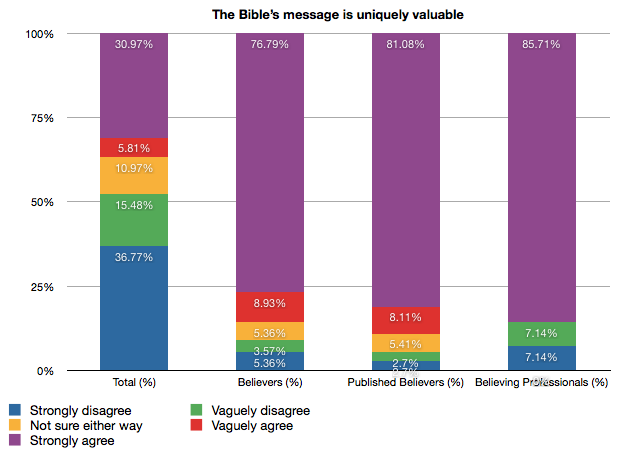
| Response | Total | Believers | Published Believers | Believing Professionals |
| Strongly disagree | 57 (36.77%) | 3 (5.36%) | 1 (2.7%) | 1 (7.14%) |
| Vaguely disagree | 24 (15.48%) | 2 (3.57%) | 1 (2.7%) | 1 (7.14%) |
| Not sure either way | 17 (10.97%) | 3 (5.36%) | 2 (5.41%) | 0 (0%) |
| Vaguely agree | 9 (5.81%) | 5 (8.93%) | 3 (8.11%) | 0 (0%) |
| Strongly agree | 48 (30.97%) | 43 (76.79%) | 30 (81.08%) | 12 (85.71%) |
| Total | 155 | 56 | 37 | 14 |
I guessed that most people, believers or not, would be happy to concede that there was some value to the Bible. This question was designed to tease out whether people thought it was more valuable than other documents, an unsurprisingly the believers felt more strongly about this than the general population.
The Bible’s Role in Knowing God
Finally, I asked a bunch of questions about the role of the Bible in how we know and relate to God. This is the section I was most interested in.
Statement 12: “God reveals himself through the Bible”
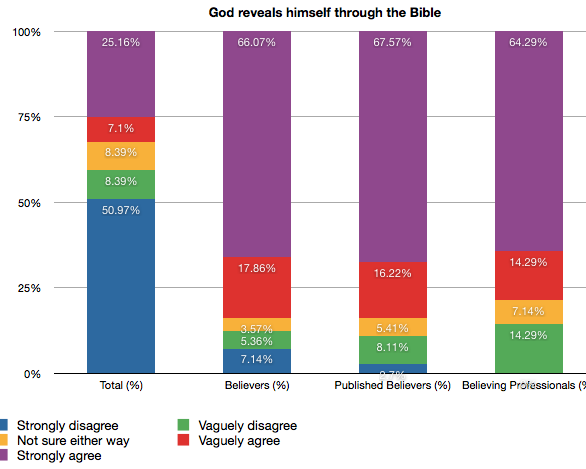
| Response | Total | Believers | Published Believers | Believing Professionals |
| Strongly disagree | 79 (50.97%) | 4 (7.14%) | 1 (2.7%) | 0 (0%) |
| Vaguely disagree | 13 (8.39%) | 3 (5.36%) | 3 (8.11%) | 2 (14.29%) |
| Not sure either way | 13 (8.39%) | 2 (3.57%) | 2 (5.41%) | 1 (7.14%) |
| Vaguely agree | 11 (7.1%) | 10 (17.86%) | 6 (16.22%) | 2 (14.29%) |
| Strongly agree | 39 (25.16%) | 37 (66.07%) | 25 (67.57%) | 9 (64.29%) |
| Total | 155 | 56 | 37 | 14 |
Statement 13: “The primary way God reveals himself is through the Bible”
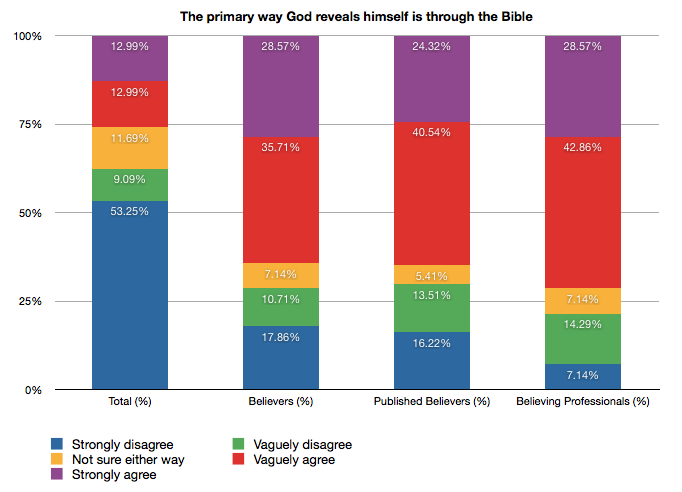
| Response | Total | Believers | Published Believers | Believing Professionals |
| Strongly disagree | 82 (53.25%) | 10 (17.86%) | 6 (16.22%) | 1 (7.14%) |
| Vaguely disagree | 14 (9.09%) | 6 (10.71%) | 5 (13.51%) | 2 (14.29%) |
| Not sure either way | 18 (11.69%) | 4 (7.14%) | 2 (5.41%) | 1 (7.14%) |
| Vaguely agree | 20 (12.99%) | 20 (35.71%) | 15 (40.54%) | 6 (42.86%) |
| Strongly agree | 20 (12.99%) | 16 (28.57%) | 9 (24.32%) | 4 (28.57%) |
| Total | 154 | 56 | 28 | 14 |
Unsurprisingly, although most believers were happy to say that God reveals himself through the Bible, people were less confident saying that the Bible was the primary way he reveals himself.
Statement 14: “The primary way God brings people into relationship with him is through the preaching of the Bible message”
| Response | Total | Believers | Published Believers | Believing Professionals |
| Strongly disagree | 85 (55.19%) | 7 (12.5%) | 4 (10.81%) | 1 (7.14%) |
| Vaguely disagree | 12 (7.79%) | 7 (12.5%) | 4 (10.81%) | 2 (14.29%) |
| Not sure either way | 17 (11.04%) | 10 (17.86%) | 8 (21.62%) | 2 (14.29%) |
| Vaguely agree | 19 (12.34%) | 15 (26.79%) | 9 (24.32%) | 3 (21.43%) |
| Strongly agree | 21 (13.64%) | 17 (30.36%) | 12 (32.43%) | 6 (42.86%) |
| Total | 154 | 56 | 37 | 14 |
For believers, this statement was apparently less controversial than the previous one, which slightly surprised me! I guess it’s because I opened it up to being about “the preaching of the Bible message” rather than simply the Bible itself.
Some Analysis
What was completely unexpected when I came to analyse the results was that people seemed to become more conservative with experience – in virtually every question, there was more certainty about statements related to the divine inspiration and the power of the Bible to reveal God amongst the published professionals group than amongst believers generally. I’m sure that in part this is because there were far fewer responses from published professionals, meaning the uncertainty of each result is much higher. But I also wondered if it reflected another trend: might it be that published professionals are likely to be older, and that older people are more likely to have conservative views about the Bible?
So I also tried taking a couple of the questions that seemed fairly good tests of orthodoxy and broke them down by age:
Statement 4: “The words of the Bible are divinely inspired”
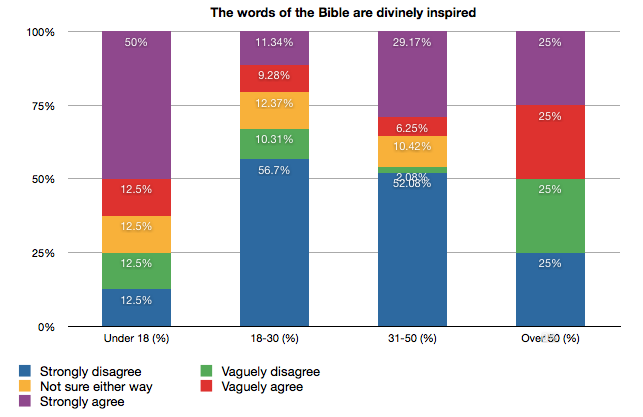
| Response | Under 18 | 18-30 | 31-50 | Over 50 |
| Strongly disagree | 1 (12.5%) | 55 (56.7%) | 25 (52.08%) | 1 (25%) |
| Vaguely disagree | 1 (12.5%) | 10 (10.31%) | 1 (2.08%) | 1 (25%) |
| Not sure either way | 1 (12.5%) | 12 (12.37%) | 5 (10.42%) | 0 (0%) |
| Vaguely agree | 1 (12.5%) | 9 (9.28%) | 3 (6.25%) | 1 (25%) |
| Strongly agree | 4 (50%) | 11 (11.34%) | 14 (29.17%) | 1 (25%) |
| Total | 8 | 97 | 48 | 4 |
Statement 14: “The primary way God brings people into relationship with him is through the preaching of the Bible message”
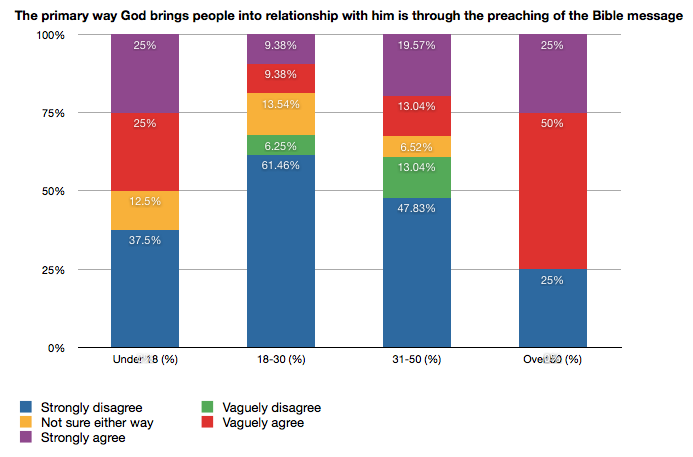
| Response | Under 18 | 18-30 | 31-50 | Over 50 |
| Strongly disagree | 3 (37.5%) | 59 (61.46%) | 22 (47.83%) | 1 (25%) |
| Vaguely disagree | 0 (0%) | 6 (6.25%) | 6 (13.04%) | 0 (0%) |
| Not sure either way | 1 (12.5%) | 13 (13.54%) | 3 (6.52%) | 0 (0%) |
| Vaguely agree | 2 (25%) | 9 (9.38%) | 6 (13.04%) | 2 (50%) |
| Strongly agree | 2 (25%) | 9 (9.38%) | 9 (19.57%) | 1 (25%) |
| Total | 8 | 96 | 46 | 4 |
Recognising the huge uncertainty in the Under 18 and 50+ data sets, this does seem to support the hypothesis that the older respondents tended to be more conservative.
With hindsight, I should have stopped and thought for a moment and realised that virtually all game developers are probably aged 18-35, so it would have been useful to have a more fine-grained breakdown of people’s ages. But it’s too late to cry over spilt milk now, as they say.
Final Thoughts
Overall, my survey design left a lot to be desired, but it still yielded some interesting results. Mostly it told me that my expectations were incorrect. The results were generally a lot more bland than I expected – I’d anticipated seeing more disagreement amongst believers than the results indicated, and they didn’t correlate with game making experience in the way I imagined they might at all.
If you would like a dump of all of the response data, drop me an email and I’ll see what I can do.
One Response to What Game Developers Think About the Bible
-
Categories
-
Articles
- July 2014
- June 2014
- January 2014
- March 2013
- March 2012
- February 2012
- January 2012
- October 2011
- August 2011
- July 2011
- June 2011
- April 2011
- March 2011
- February 2011
- January 2011
- December 2010
- November 2010
- June 2010
- May 2010
- April 2010
- March 2010
- February 2010
- December 2009
- October 2009
- August 2009
- July 2009
- June 2009
- May 2009
- March 2009
- February 2009
- January 2009
- November 2008
- August 2008
- March 2008
- January 2008
- December 2007
-
Meta
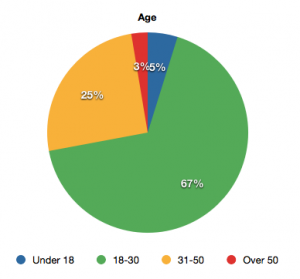
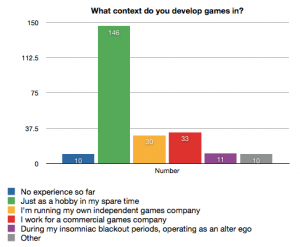
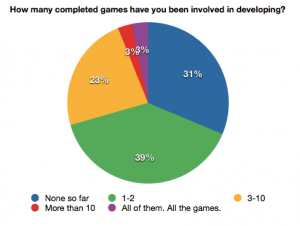
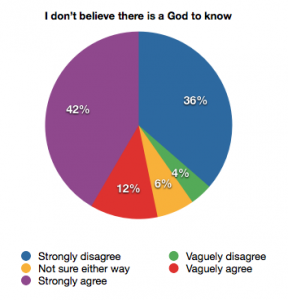
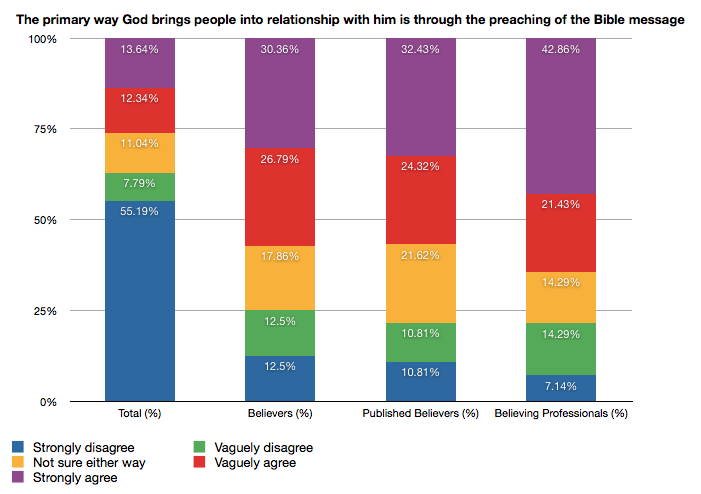






[…] The survey is now closed and the results have been published here. Tagged with: bible • game development • gamedev • survey If you […]